PDF file - Community Services Center
PDF file - Community Services Center
PDF file - Community Services Center
- No tags were found...
Create successful ePaper yourself
Turn your PDF publications into a flip-book with our unique Google optimized e-Paper software.
pro<strong>file</strong>that a Christian should become aHindu … but our innermost prayershould be a Hindu should be a betterHindu, a Muslim a better Muslim, aChristian a better Christian." Muchin the same way, Mark's hope formeat eaters is not that they embracevegetarianism, but that they becomebetter meat eaters. “We all needto be more aware of what we areeating”, he says, “there are manycommercial interests out there tryingto make money out of tricking usinto eating shoddily manufacturedprocessed foods”.Not Only MeatlessMondaytext: Marina BuranaIn this modern era, in whicheverything seems to be aboutmoney and leading hectic liveswith no time to think aboutsomething as basic and important aswhat we eat, like a character in themovie American Gangster once said:“you can't find the heart of anythingto stick the knife”. Fortunately whenit comes to food, we still have peoplelike Mark Caltonhill who wantto make us more aware of whereexactly we stick the knife.Mark, a vegetarian writer wholives in Taipei, has not set out topreach about why it is importantto leave meat aside and become aveggie; instead, his primary concernseems to be how we handle our dailydiet and how responsible we arefor both the environment and ourown body. He has been living herein Taiwan for twenty years and helong considered himself a “failedvegetarian”, always being too lazyto eat less meat or no meat at all. Itwasn't until three years ago that,after reading a UN report sayingthat animal farming for meat eatingis contributing more climate changeiMages: Mark caltonhill, PriMavera racing teaMWhatsoever was the father of a disease, an ill diet was themother.- george herbertemissions than all transportationcombined, he stopped eating meatfor good. Unlike most people whodecide to become veggies, who ingeneral do it for religious reasonsor to protect the animals, Markjust feels his is a good choice forthe planet and for living his life.According to what he says, thisdecision not only changed the wayhe relates with the environment, butit also gave him important healthbenefits.Let vegetarianism grow onyou... or notWhen we first met, he suggestedwe go to a very nice vegetarianrestaurant in Xinyi District so that Icould try its food. It turned out to bereally good, I must say. But Mark'spurpose is far from convincingpeople to try vegetarian food andbecome vegetarians. He respectsother people's choices, but insistson the idea that everyone should bemore aware of what they eat. WhileI enjoyed a good vegetable soup, hequoted Gandhi, who said ''(…) wecan only pray, if we are Hindus, notHeaLtHy food options foreveryoneAll the way from Manchester, andsettled in an Asian country whichhe calls ''home'', Mark has beenfocusing on writing about places youcan visit in Taiwan where they serveamazing vegetarian food, and ondoing research on food issues. Hethinks Taiwan is a good place to bea vegetarian because you can findsome kind of vegetarian restaurantround almost every corner. Thebad thing is that in some cases theycan be difficult for foreigners tofind. That's why he came up witha very interesting blog called NotOnly Meatless Monday (NOMM).In it, he not only writes reviewsabout restaurants, but also doesgood research about food-relatedtopics, such as food and health, foodpolitics, school lunch provision,organic farming, localization of foodproduction, cook-it-yourself, etc.He adds some interesting color tohis blog when he talks about thingsthat matter with a little bit of humor,or when he explains the differencebetween quán sù ( 全 素 ; completelyvegetarian) or dàn ni sù ( 蛋 奶 素 'egg-milk vegetarian), and guo biansù ( 鍋 邊 素 ; "pot-side vegetarian").He regularly checks the Chineselanguagemedia for food-relatedarticles and translates them intoEnglish. He also introduces theidea of 'up-stream cooking'. “Thismeans”, he says, “trying to usefewer and fewer processed foods andwork oneself upstream towards thecomplete use of fresh produce. Oneexample is that although I have madehummus for about three decades, Ialways used shop-bought tahini. Itwas only a couple of years ago that18 march 2012 www.communitycenter.org.tw



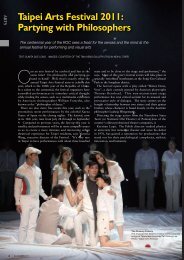
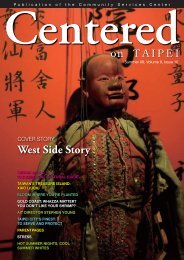


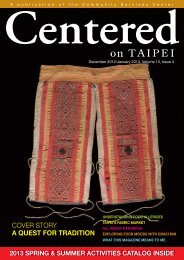

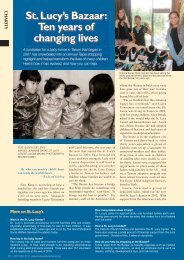

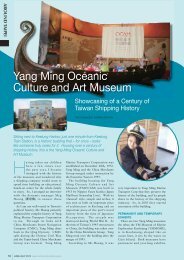
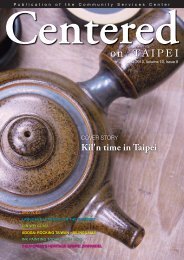



![Rice 米 [mi] - Community Services Center](https://img.yumpu.com/22967832/1/184x260/rice-mi-community-services-center.jpg?quality=85)